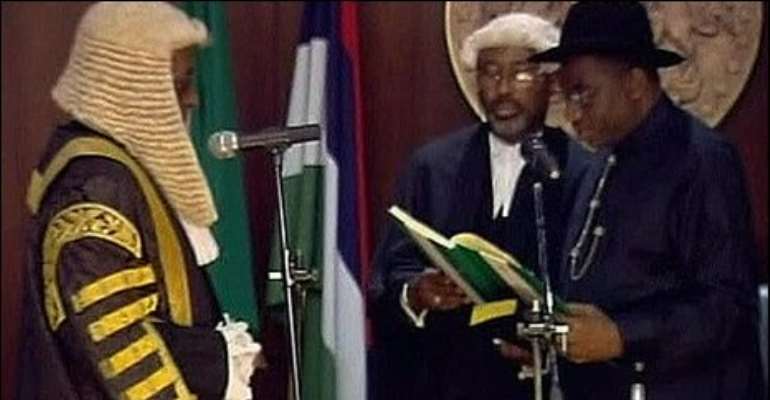Nigeria's Goodluck Jonathan sworn in as president

Nigeria's acting President Goodluck Jonathan has been sworn in as head of state following the death of President Umaru Yar'Adua after a long illness.
Mr Jonathan, in charge since February, will appoint a deputy and serve out the rest of the current presidential term until elections due next year.
Mr Yar'Adua died late on Wednesday in the capital Abuja. TV broadcasts were interrupted with the news.
Seven days of national mourning have been announced.
Mr Jonathan took the oath of office in front of government ministers and other officials at the presidential villa in Abuja almost 12 hours after Mr Yar'Adua died. The ceremony was performed by the chief justice of Nigeria, Alloysius Katsina-Alu.
Mr Jonathan put on a sash bearing the green, yellow and white colours of Nigeria, signifying he had formally taken over as president.
| UMARU YAR'ADUA |
|
Afterwards he made a brief address, saying his administration would focus on good governance, electoral reform and the fight against corruption.
"One of the true tests will be that all votes count, and are counted, in our upcoming presidential election," he said.
Mr Yar'Adua, who was 58, will be buried in a Muslim ceremony later on Thursday in his northern home state of Katsina, officials said.
US President Barack Obama has led tributes from world leaders, praising Mr Yar'Adua's profound personal decency and integrity" and his "passionate belief in the vast potential and bright future of Nigeria's 150 million people".
Mr Yar'Adua came to power in 2007 promising a string of reforms in Africa's most populous nation.
Analysts say he made the most progress in tackling unrest in the oil-rich Niger Delta by offering amnesties to rebels.
He had been absent from the political scene since November, when he went to a hospital in Jeddah, Saudi Arabia, for several months.
During that time he was not heard from, apart from a BBC interview. He returned to Nigeria in February but remained too sick to govern.
A presidential spokesman said at the time that he was being treated for acute pericarditis, an inflammation of the lining around the heart.
His long absence and the lack of detailed information about his health led to a political limbo in Nigeria, which was only filled when Mr Jonathan was named as acting president.

